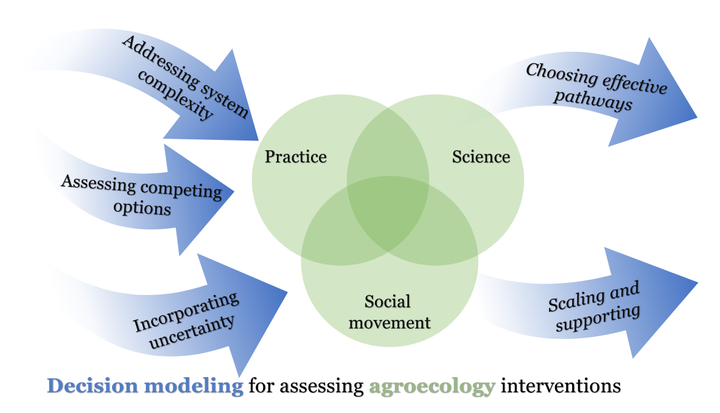New publication - Decision analytical methods for assessing the efficacy of agroecology interventions

Unlocking the Potential of Agroecology: Leveraging Decision Analysis for Informed Decision-Making … Making decisions about interventions to agroecological systems is difficult given their inherent complexity and the resulting uncertainty about the impacts of any proposed changes. Action requires stakeholders, policymakers and land managers to choose between alternatives. These actors often seek to support both human nutrition and ecosystems. Approaches for producing reliable impact projections accounting for system complexity and uncertainty exist but decision-makers rarely use them. Such approaches could be widely applied to assess the costs, benefits, and risks of agroecology development. A team of researchers from the University of Bonn, Cory Whitney, Lisa Biber-Freudenberger and Eike Luedeling, have recently reviewed the literature on decision theory as a methodology for supporting decision-making in agroecology. They present an overview of their findings in a new publication. They outline the conceptual relationships between decision-analysis methods and agroecology and examine how decision-analysis methods can be applied to support decision-making for agroecological transitions.
Decision sciences can provide practical decision support in the face of system complexity, uncertainty, risks, and unclear benefits of agroecology interventions. The approaches can allow those who are formulating interventions to systematically compare the outcomes, and explicitly incorporate uncertainty associated with decision options. This approach can aid decision-makers in evaluating the potential effects of various management or policy actions related to agroecology. It provides transparent and valuable information about the types of trade-offs and the level of risk associated with any resulting decisions. Results from the modeling procedures can help support decisions according to intended outcomes, with risks and uncertainty explicitly included, and help decision-makers identify where agroecology interventions make sense for achieving desired results.
Decision analysis methods can play a critical role in determining the suitability of agroecology interventions, and in supporting and scaling them when appropriate. Relevant international and national government processes and funding mechanisms, as well as the private sector, should make use of these methods to determine if and when agroecology interventions are appropriate, and for supporting and scaling them when they are. The integration of decision analysis methods in agroecology can provide transparent and useful information about the types of trade-offs and the level of risk associated with any resulting decisions, facilitating the achievement of desired outcomes while accounting for risks and uncertainty.
Whitney, Biber-Freudenberger, Luedeling, Decision analytical methods for assessing the efficacy of agroecology interventions, CABI Agriculture and Bioscience, https://doi.org/10.1186/s43170-023-00151-9
Whitney, Decision Analysis and Agroecology, searchRxiv, https://doi.org/10.1079/searchRxiv.2023.00095